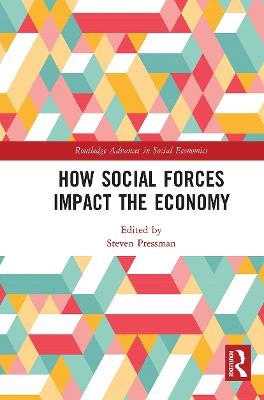
How Social Forces Impact the Economy
Routledge (Verlag)
978-1-032-23568-4 (ISBN)
Social forces are important determinants of how people behave, how economies work at the macroeconomic level, and the effectiveness of economic policies. However, this dimension is generally overlooked in mainstream economics. How Social Forces Impact the Economy demonstrates that a broader conception of social economics provides for a better understanding of how economies work as a whole.
This book argues that adopting a truly social approach to economics opens the door to studying how people form preferences, and how they learn by taking cues from others about how to behave and what to consume. Each chapter contributor works to highlight the breadth of new insights and possibilities that emerge from a fuller understanding of social economics. Part I focuses on microeconomics, bringing individual behaviors and individual entrepreneurs into a more social context. Part II focuses on macroeconomic topics, such as how money and quasi-monies (like Bitcoins) are social, how money developed as a social institution, and how social forces matter for economic development. Finally, Part III looks at the consequences of considering social factors when it comes to policy: environmental policy, industrial policy, and policies promoting greater equality.
This book is invaluable reading to anyone interested in the relationship between economics and sociology, how social forces affect policy effectiveness, human behavior, and the overall economy.
Steven Pressman is Professor of Economics at Colorado State University, USA, and Emeritus Professor of Economics and Finance at Monmouth University, USA.
1. Introduction: Putting the Social Back into Economics Part I: Individual Behavior 2. Becker’s Two Models of Social Interaction 3. Greed, Need and Solidarity: The Socialization of Homo Economicus 4. The Burden of Knowledge and Schumpeter’s Innovation Part II: Macroeconomics and Money 5. Money as Social Institution: Its Historical Emergence and Political Implications 6. A Closer Look at the Promise of the Blockchain in Banking and Biobanking 7. When the Cultural Argument Goes too Far: The Need to Limit Particularism and Welcome Convergence on Socially Progressive Goals Part III: Policy Issues 8. Industrial Policy and Societal Goals: A New Look at the American Case (from Hamilton to Obama and Trump) 9. Relational Determinants of International Environmental Cooperation: A Panel Analysis 10. Explaining Inequality: Facts are No Longer Enough
| Erscheinungsdatum | 02.02.2022 |
|---|---|
| Reihe/Serie | Routledge Advances in Social Economics |
| Zusatzinfo | 22 Illustrations, black and white |
| Verlagsort | London |
| Sprache | englisch |
| Maße | 156 x 234 mm |
| Gewicht | 349 g |
| Themenwelt | Geschichte ► Teilgebiete der Geschichte ► Wirtschaftsgeschichte |
| Wirtschaft ► Allgemeines / Lexika | |
| Wirtschaft ► Volkswirtschaftslehre ► Wirtschaftspolitik | |
| ISBN-10 | 1-032-23568-3 / 1032235683 |
| ISBN-13 | 978-1-032-23568-4 / 9781032235684 |
| Zustand | Neuware |
| Informationen gemäß Produktsicherheitsverordnung (GPSR) | |
| Haben Sie eine Frage zum Produkt? |
aus dem Bereich


